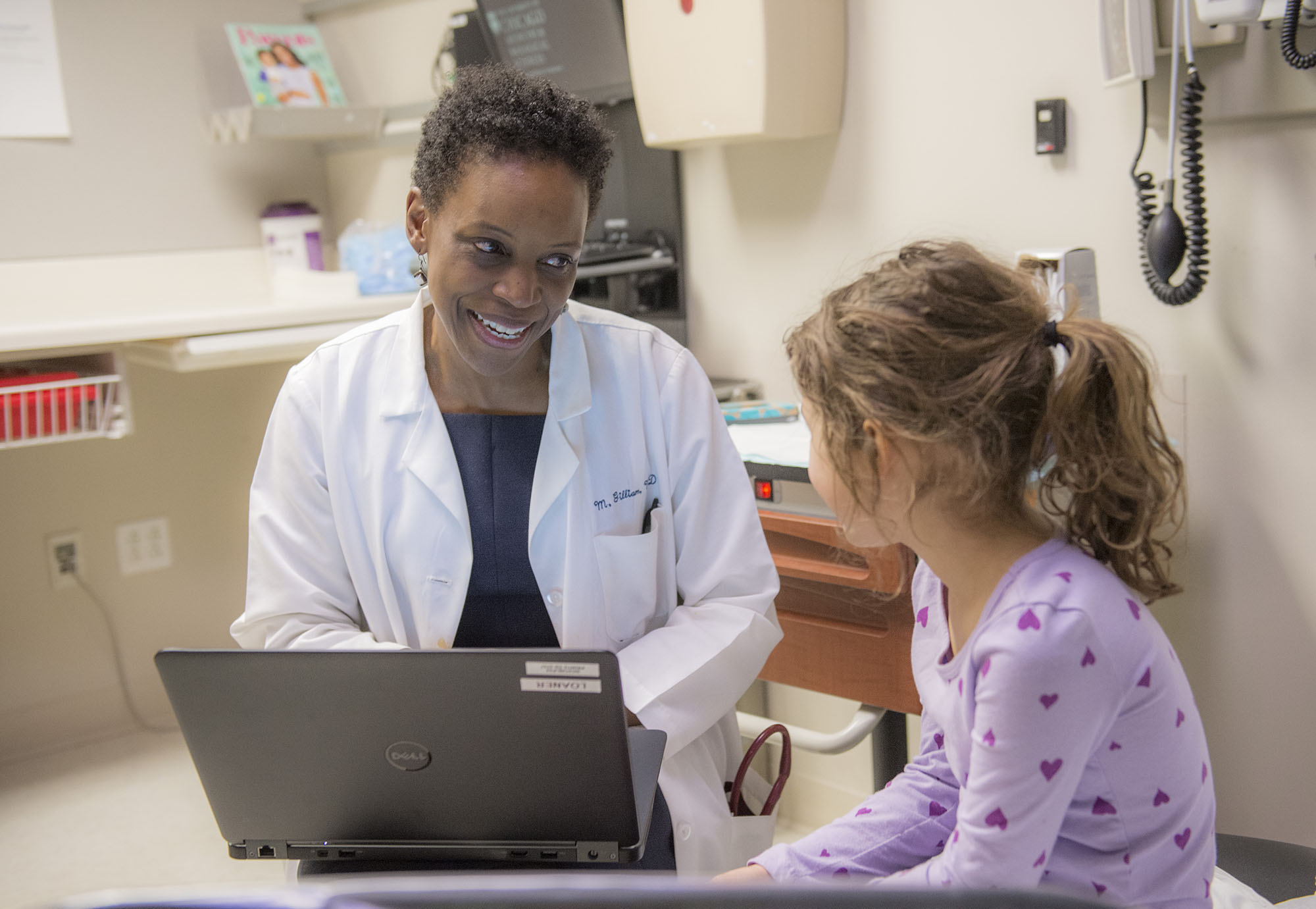Melissa L. Gilliam, BU’s New President, Brings Robust Research Background in Well-Being of Young People
As a research scientist with international experience, and a physician trained in obstetrics and gynecology, Gilliam has dedicated years to collaborating with young people

Melissa L. Gilliam takes a collaborative, interdisciplinary approach to her research. It’s the same approach she takes in her leadership roles, as well.
Melissa L. Gilliam, BU’s New President, Brings Robust Research Background in Well-Being of Young People
As a research scientist with international experience, and a physician trained in obstetrics and gynecology, she has dedicated years to collaborating with young people
Melissa L. Gilliam is no stranger to the rich inner lives and challenges of young people. As a research scientist and a physician trained in obstetrics and gynecology, she’s dedicated years to working with adolescents and teenagers. To do so, she’s learned to get away from the offices and boardrooms where her young patients’ medical histories exist on paper, and go listen to them in person.
And so, when Gilliam—who was named Boston University’s 11th president on Wednesday—eventually moves into her new office at One Silber Way, she’ll carry in more than her personal effects and two decades of leadership experience. Gilliam also brings a deep scholarship in medicine, public health, and the humanities. She is a member of the National Academy of Medicine, and her interdisciplinary research has taken her to Uganda, Nigeria, and India.
Gilliam joins BU from The Ohio State University, where she serves as executive vice president and provost, and holds the Engie-Axium Endowed Chair. To thrive in the role of University president, she says, will require the skills she’s honed as an administrator, educator, research scientist, and physician.
For Gilliam, there is no dichotomy between humanities and STEM. “I use humanistic practices to think about how we think about health and improve outcomes for young people,” she says.
“There are times when I meaningfully bring different types of perspectives and methodologies into the work that I do,” says Gilliam, who will assume her new post on July 1, 2024. Research and clinical care “have given me a tremendous respect for how many people across organizations often have ideas—often great ideas—but that you can’t necessarily access those perspectives,” she says. “So, that’s led me to have a really collaborative research approach, informed by principles of participatory design, enabling me to change my vantage point.”
Improving methodologies—and well-being
Gilliam’s outlook has helped establish her as a national leader in adolescent research and practice, as well as in higher education administration. She’s served in roles first at the University of Illinois Chicago, then the University of Chicago, and most recently, at Ohio State.
“Dr. Gilliam has focused her research on adolescent health and well-being, seeking to understand and impact the lives of adolescents with particular attention to marginalized young people,” says Hee-Young Park, a member of BU’s presidential search committee and a professor and chair of medical sciences and education at the Chobanian & Avedisian School of Medicine.
“Her studies have had a significant impact globally,” Park adds, which is why Gilliam was elected as a member of the National Academy of Medicine, a world leader in providing scientific and policy advice.
“Dr. Gilliam’s broad research experiences will foster and nurture the collaboration and partnership across the disciplines at the University to improve the well-being of individuals, especially in marginalized populations,” says Park, who is also the medical school’s associate dean for faculty affairs.
When Gilliam was a resident at Northwestern Memorial Hospital in Chicago, she became interested in teenage pregnancy—and in particular, why some teenagers became pregnant again within a year of delivery.

“I had initially focused on thinking about different methods of contraception and compliance with contraception,” Gilliam says. “And so I was interested in individual knowledge, attitudes, and behaviors, especially around contraceptive use and repeat teen pregnancies. But I was working in a very biomedical framework, and really thinking a lot about clinical trials and technology.”
Gilliam found, however, that she increasingly wanted to put “the young person at the center” of her inquiry—asking them about their lives and aspirations rather than focusing on risk behaviors. A faculty member at the University of Illinois at Chicago at the time, she left the clinic and went into neighborhoods on the South and West sides of Chicago and considered whether clinical care was actually designed to meet the needs of adolescents and their families.
“I realized that if we’d simply asked and engaged them, then we could identify solutions that actually worked within the context they were living in,” she says. “It was a wake-up call.”
This approach led her to new avenues for research, and new insights into the hardship that two-visit intrauterine device (IUD) insertions create for young people, for example. These new inquiries joined Gilliam’s already robust body of research that includes examination of concerns about contraceptive use among young Latinas and the factors that contribute to IUD uptake in postpartum adolescents, among others.
She’s published the findings from these and more than 100 other peer-reviewed studies in leading academic journals such as the Journal of Adolescent Health, Obstetrics & Gynecology, and the American Journal of Obstetrics & Gynecology. Gilliam has received continuous funding throughout her career from organizations that include the National Institutes of Health, the John D. and Catherine T. MacArthur Foundation, the Irving Harris Foundation, the National Science Foundation, the Ford Foundation, and other federal, foundation, and individual donor sources.
Collaborative approach to domestic and international research
As Gilliam explored the social determinants of health among young people in Chicago, she realized that she needed to include young people, community members, and faculty from across the university in her research. These insights led her to create the University of Chicago’s Center for Interdisciplinary Inquiry and Innovation in Sexual and Reproductive Health (Ci3), a collaborative enterprise that uses games, narrative, and design to understand and improve adolescent health and well-being. She became particularly interested in education, mental health, and optimism for the future as means of promoting young health and well-being.
Gilliam’s work extends beyond the United States, as well. She was among the principal investigators for a long-term research project in India—funded by the Bill & Melinda Gates Foundation—where she helped train members of nongovernmental organizations in novel, youth-friendly data collection techniques.
“That translation of experience—going into different cultures and trying to figure out how to work in a really rich and collaborative way—has been very powerful for me,” Gilliam says. “It’s another piece that brings a lot of excitement for me when thinking about Boston University and its global footprint: the opportunities that we have to continue to be more global at a time when perhaps people are starting to contract.”
In addition to her own work, Gilliam has gained a deep understanding of the national research landscape. She serves on the Board of Governors of Argonne National Laboratory, one of the leading labs supported by the Department of Energy, and previously held advisory appointments for the National Institute of Child Health and Human Development and the Food and Drug Administration. She also served as board chair of the Guttmacher Institute and of the Society of Family Planning and currently serves on the board of the Andrew W. Mellon Foundation.
This robust experience, Park says, positions Gilliam to build upon Boston University’s renown as an innovative research institution that demonstrates creativity across disciplines.
“BU is known for its academic and research excellence,” Park says. “Over the past few decades, BU has expanded and established infrastructures and programs to support and sustain robust research and educational activities. Dr. Gilliam is an accomplished researcher with strong experiences in leading complex institutions; she is well positioned to lead, support, and grow the academic and research enterprise at BU.”
Comments & Discussion
Boston University moderates comments to facilitate an informed, substantive, civil conversation. Abusive, profane, self-promotional, misleading, incoherent or off-topic comments will be rejected. Moderators are staffed during regular business hours (EST) and can only accept comments written in English. Statistics or facts must include a citation or a link to the citation.